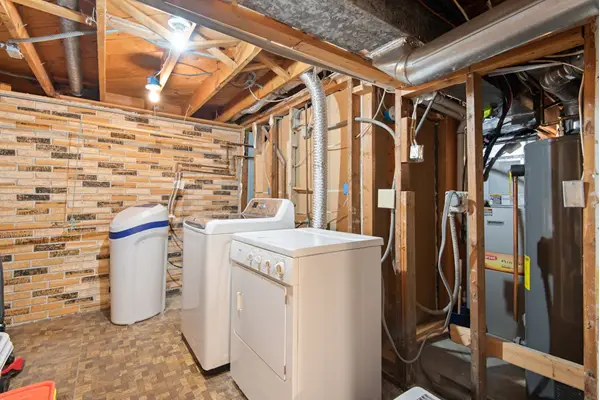I recently replaced my very old tank type water heater. So, this was the perfect time to answer the question: Is my water heater too small?
We could not shower and run the clothes washer at the same time. Also, back-to-back showers had to be short to prevent having lukewarm water for the second person.
The problem was that I never drained the sediment out of the tank like I was supposed to do. The sediment comes from the minerals in the water. It reduces the amount of water the tank can hold. Effectively, I had a 20-gallon water heater.
Ultimately, I bought the same size 40-gallon water heater. However, you may need a larger water heater. Keep reading to find out.
Cold showers. Delayed laundry. Constant waiting. These everyday frustrations might seem minor at first, but they often point to a bigger issue—a water heater that is too small for your needs.
Many households outgrow their systems without realizing it. As your daily routines change or your family grows, your old unit may struggle to keep up.
If hot water runs out too quickly or takes too long to return, your water heater could be the reason. In many cases, it may no longer be the right size—or may even need replacing.
Is your water heater too small? This guide will help you spot the signs before it becomes a bigger hassle.
Table of Contents
You Run Out of Hot Water Too Fast
If your shower suddenly turns cold halfway through, you’re not alone. This is one of the most obvious signs that your water heater is too small for your household. When your tank can’t keep up, it runs out before everyone’s done using it. Common signs include:
- Cold showers when multiple people bathe back-to-back
- Running out of hot water during dishwashing or laundry
- Only one task can use hot water at a time
Most homes need about 10–15 gallons of hot water per person each day. If your tank holds 40 gallons but you’ve got four people, that math doesn’t work anymore.
Rising Energy Bills Might Be a Sign of a Water Heater That Is Too Small
A water heater that’s too small works harder than it should, using more energy and driving up your utility bills. If you’ve noticed rising energy costs without any major lifestyle changes, your heater could be to blame.
In areas where winter temperatures drop significantly, this issue is even more common. Older, smaller units may struggle to meet demand, causing energy bills to climb.
If you’re moving to a place like this, be sure to consider the size of your water heater before the cold weather hits. If you start to feel overwhelmed during your relocation process, why not see what professionals have to say?
Professional movers, such as Brooks Moving, can provide useful insight into the post-move adjustment period and things to pay attention to when moving into a new home.

Hot Water Takes Too Long to Reheat
If someone takes a shower and the next person has to wait 30 minutes or more, your water heater may be falling behind. Smaller tanks need more time to refill and heat the water again. That delay can be frustrating, especially during busy mornings or evenings.
This gets worse as your hot water use increases. Running the dishwasher, doing laundry, and showering back-to-back pushes your heater to its limit. Over time, you may notice it takes longer than it used to. That’s a clear sign your system isn’t keeping pace anymore.
The Water Temperature Fluctuates
If your hot water keeps changing from warm to cold without warning, your heater might be running out mid-use. This often happens when a small tank can’t keep up with demand, especially when multiple taps or appliances are using hot water at the same time.
The system tries to stretch the supply by mixing in cold water, which causes those sudden shifts in temperature. It’s a clear sign that your current setup may not match your household’s needs anymore.
You’ve Added More People or Appliances
Your water heater might have worked fine a few years ago. But things change. Maybe your family has grown. Maybe you’ve added a roommate. Even something as simple as hosting guests more often can push your system past its limit.
More people mean more showers, more laundry, and more dishes. All of that uses hot water. If your tank size hasn’t changed, it might not be enough anymore.
New appliances can also increase demand. Big bathtubs, high-flow showerheads, or modern washers use more hot water than older ones. If your heater wasn’t sized with these in mind, it could be struggling to keep up.

The Tank is Over 10 Years Old
Water heaters don’t last forever. After about 10 years, many start to lose performance. Sediment builds up inside the tank, which takes up space and makes it harder to heat water. That buildup also increases wear on the system.
An older, smaller unit often struggles more with daily use and can become unreliable. If your heater is past the 10-year mark and you’re noticing more problems, it might be time to look at better options before a breakdown happens.
You’re Always Adjusting Schedules
If you’re constantly timing showers, laundry, and dishes to avoid running out of hot water, your system isn’t doing its job. Having to plan your day around hot water use can be a big hassle. You shouldn’t have to wait for one person to finish before the next can use hot water.
A water heater that can’t keep up with your family’s needs forces you into these uncomfortable routines. It’s a sign that your current system is too small to handle your lifestyle.
You Frequently Hear Strange Noises
Hearing rumbling, popping, or crackling sounds from your water heater is more than just annoying—it’s a warning sign. These noises are often caused by sediment buildup at the bottom of the tank. As water heats, trapped air bubbles try to escape, creating strange sounds.
Over time, this buildup takes up valuable space, reducing your tank’s capacity. The more sediment accumulates, the harder it is for your system to heat water effectively.
If these sounds have become a regular occurrence, it’s time to consider how much longer your current heater will last under the pressure.
You Want Better Comfort and Convenience
If you’re tired of planning your day around hot water availability, it might be time for a change. Newer or larger water heaters offer more consistent comfort and convenience.
With a bigger tank or a tankless model, you can enjoy hot water on demand without worrying about running out.
Plus, some modern systems come with features like temperature controls and energy-saving modes, making it easier to enjoy the right amount of hot water exactly when you need it.
Upgrading your water heater means less hassle and more comfort every day.

Hot Water Shouldn’t Be a Daily Challenge
If you’re frequently running out of hot water, waiting too long for it to heat up, or struggling to get through a full shower, it’s a clear sign that your water heater is too small for your needs.
These problems don’t have to be a daily struggle. By upgrading to a larger, more efficient water heater, you can eliminate these frustrations.
A better system will keep up with your household’s demands, save you time, and ensure your hot water is always ready when you need it.
Water Heater Too Small? Consider A Tankless Water Heater
You can add a small tankless water heater for a single sink or shower instead of buying a larger tank style water heater.
If your tank style water heater is old enough to replace, consider getting a whole house tankless water heater.